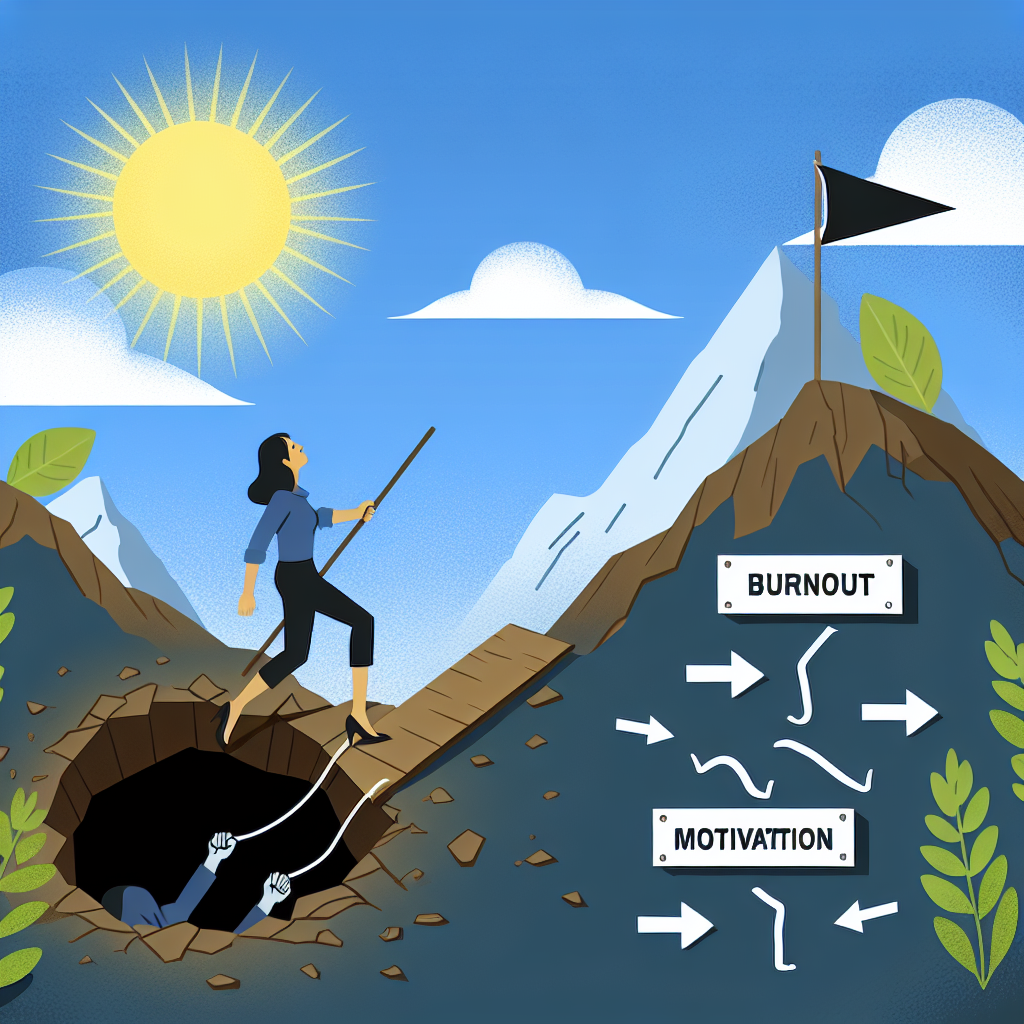
5 Signs of Burnout and How to Overcome Them
Burnout is a term that has become increasingly common in today’s fast-paced and demanding society. It refers to a state of physical, emotional, and mental exhaustion caused by prolonged stress and overwork. Many people experience burnout at some point in their lives, whether it’s due to work, personal relationships, or other responsibilities. It can leave you feeling drained, unmotivated, and overwhelmed. However, the good news is that burnout is not a permanent state, and there are ways to overcome it and find motivation again. In this article, we will discuss five signs of burnout and how to overcome them.
1. Physical and Emotional Exhaustion
One of the most common signs of burnout is feeling physically and emotionally exhausted. You may feel drained and have no energy to do even the simplest tasks. You may also experience frequent headaches, muscle tension, and stomach problems. Emotionally, you may feel irritable, moody, and have difficulty concentrating. If you find yourself feeling constantly tired and overwhelmed, it may be a sign that you are experiencing burnout.
To overcome physical and emotional exhaustion, it’s essential to take care of yourself. Make sure you are getting enough sleep, eating a healthy diet, and exercising regularly. It’s also crucial to take breaks throughout the day and set boundaries to avoid overworking yourself. Additionally, try to find activities that bring you joy and relaxation, such as reading, listening to music, or spending time in nature.
2. Lack of Motivation
Another sign of burnout is a lack of motivation. You may find yourself feeling uninterested in things that used to bring you joy and passion. You may also struggle to find the energy to complete tasks or meet deadlines. This lack of motivation can be frustrating and can lead to feelings of guilt and self-doubt.
To overcome this, it’s essential to set realistic goals and prioritize your tasks. Break down larger tasks into smaller, more manageable ones, and reward yourself for completing them. It’s also helpful to find a support system, whether it’s friends, family, or a therapist, to talk to and gain perspective. Remember to be kind to yourself and celebrate small victories along the way.
3. Isolation and Detachment
Burnout can also cause you to withdraw from social interactions and isolate yourself. You may feel like you don’t have the energy or desire to spend time with friends and family. You may also feel detached from your work and personal relationships, leading to feelings of loneliness and disconnection.
To overcome isolation and detachment, it’s crucial to reach out to your support system and communicate your feelings. It’s also helpful to engage in activities that involve social interaction, such as joining a club or volunteering. Additionally, try to find meaning and purpose in your work and relationships, and remind yourself of the positive impact you have on others.
4. Decreased Performance
Burnout can also affect your performance at work or school. You may find it challenging to concentrate, make decisions, or complete tasks efficiently. This can lead to a decrease in productivity and quality of work, which can further contribute to feelings of burnout.
To overcome decreased performance, it’s essential to set realistic expectations for yourself and communicate with your superiors or professors about your workload. It’s also helpful to take breaks throughout the day and practice mindfulness techniques to improve focus and concentration. Additionally, try to find ways to make your work more enjoyable, such as setting personal goals or finding new challenges.
5. Negative Outlook
Lastly, burnout can cause a negative outlook on life. You may find yourself feeling pessimistic, cynical, and hopeless. This can affect your relationships and overall well-being.
To overcome a negative outlook, it’s crucial to practice self-care and engage in activities that bring you joy and positivity. It’s also helpful to challenge negative thoughts and replace them with more realistic and positive ones. Surround yourself with positive and supportive people, and seek professional help if needed.
In conclusion, burnout is a common experience, but it’s not something that you have to live with forever. By recognizing the signs and taking steps to overcome them, you can find motivation and joy in your life again. Remember to prioritize self-care, set boundaries, and seek support when needed. With time and effort, you can overcome burnout and live a happier and more fulfilling life.
The Importance of Self-Care in Combating Burnout
Burnout is a term that has become increasingly common in today’s fast-paced society. It refers to a state of physical, emotional, and mental exhaustion caused by prolonged stress and overwork. Many people, especially those in high-pressure jobs, experience burnout at some point in their lives. It can leave you feeling drained, unmotivated, and unable to cope with daily tasks. However, the good news is that burnout is not a permanent state, and with the right strategies, it can be overcome.
One of the most crucial steps in overcoming burnout is practicing self-care. Self-care refers to any activity that we do deliberately to take care of our mental, emotional, and physical well-being. It is not a luxury but a necessity, especially for those who are experiencing burnout. Taking care of yourself is essential because it helps you recharge and replenish your energy levels, making you better equipped to handle stress and challenges.
The first step in practicing self-care is recognizing the signs of burnout. These can include physical symptoms such as fatigue, headaches, and muscle tension, as well as emotional symptoms like irritability, anxiety, and a lack of motivation. If you are experiencing any of these symptoms, it is crucial to take a step back and assess your situation. Are you overworking yourself? Are you neglecting your needs? Identifying the root cause of your burnout is the first step in overcoming it.
Once you have recognized the signs of burnout, the next step is to make self-care a priority. This can be challenging, especially if you are used to putting others’ needs before your own. However, it is essential to remember that you cannot pour from an empty cup. Taking care of yourself is not selfish; it is necessary for your well-being and the well-being of those around you. Start by setting aside time each day to do something that brings you joy and relaxation. It can be as simple as taking a walk, reading a book, or practicing a hobby.
Another crucial aspect of self-care is setting boundaries. Many people who experience burnout have a hard time saying no to additional responsibilities and commitments. However, it is essential to recognize your limits and learn to say no when necessary. Setting boundaries can also mean limiting your work hours and taking breaks throughout the day. It may seem counterintuitive, but taking breaks can actually increase productivity and prevent burnout.
In addition to setting boundaries, it is also essential to practice self-compassion. Many people who experience burnout tend to be hard on themselves, blaming themselves for not being able to handle the stress. However, it is crucial to remember that burnout is not a sign of weakness, but rather a result of prolonged stress and overwork. Be kind to yourself and practice self-compassion by acknowledging your efforts and achievements, no matter how small they may seem.
Finally, seeking support is crucial in overcoming burnout. This can be in the form of talking to a trusted friend or family member, seeking professional help, or joining a support group. It is essential to have a support system that can provide you with emotional support and guidance during this challenging time.
In conclusion, self-care is crucial in combating burnout and finding motivation again. It is not a one-time fix but a continuous practice that requires effort and dedication. Remember to recognize the signs of burnout, make self-care a priority, set boundaries, practice self-compassion, and seek support. By taking care of yourself, you will not only overcome burnout but also improve your overall well-being and quality of life.
Finding Your Passion Again: Tips for Rediscovering Motivation
Are you feeling exhausted, overwhelmed, and lacking motivation? You may be experiencing burnout. Burnout is a state of emotional, physical, and mental exhaustion caused by prolonged stress and overworking. It can affect anyone, from students to professionals, and can have a significant impact on our overall well-being. However, the good news is that burnout is not permanent, and there are ways to overcome it and find your motivation again.
The first step in overcoming burnout is to recognize and acknowledge that you are experiencing it. Many people tend to push through and ignore the signs of burnout, thinking that it will go away on its own. However, ignoring burnout can lead to more severe consequences, such as chronic stress, anxiety, and depression. So, take a moment to reflect on your current state and be honest with yourself. Are you feeling exhausted, irritable, and demotivated? If yes, then it’s time to take action.
One of the most effective ways to overcome burnout is to take a break. It may seem counterintuitive, especially if you have a lot on your plate, but taking a break is crucial for your well-being. It doesn’t have to be a long vacation; even a short break can make a significant difference. Use this time to disconnect from work and do things that you enjoy. Spend time with your loved ones, engage in a hobby, or simply relax and recharge. Taking a break will help you gain perspective and come back with renewed energy and motivation.
Another way to overcome burnout is to set boundaries. Many people who experience burnout have a hard time saying no and tend to take on more than they can handle. It’s essential to set boundaries and learn to say no when necessary. It’s okay to prioritize your well-being and decline tasks or responsibilities that will only add to your stress and exhaustion. Setting boundaries will also help you manage your time better and avoid overworking, which can lead to burnout.
Finding your passion again is also crucial in overcoming burnout. Burnout can make us lose interest in things that we once enjoyed. However, it’s essential to reconnect with your passions and find joy in them again. Take some time to reflect on what makes you happy and what you are passionate about. It could be a hobby, a cause, or a career path. Once you have identified your passion, make time for it in your daily life. Engaging in activities that bring you joy and fulfillment will help you combat burnout and find motivation again.
Moreover, it’s essential to take care of your physical and mental health. Burnout can take a toll on our bodies and minds, so it’s crucial to prioritize self-care. Make sure to get enough sleep, eat a balanced diet, and exercise regularly. These simple habits can have a significant impact on our overall well-being and help us manage stress better. Additionally, consider incorporating mindfulness practices such as meditation or yoga into your routine. These practices can help reduce stress and improve mental clarity and focus.
Lastly, seeking support from others can also help in overcoming burnout. Talk to your friends, family, or a therapist about how you are feeling. It’s essential to have a support system that you can rely on during difficult times. They can offer a listening ear, provide advice, or simply be there for you. Remember, you don’t have to go through burnout alone.
In conclusion, burnout is a common experience, but it’s not something that we have to live with forever. By recognizing and acknowledging burnout, taking breaks, setting boundaries, finding our passion again, taking care of our physical and mental health, and seeking support, we can overcome burnout and find our motivation again. Remember to be patient with yourself and take things one step at a time. With these tips, you can overcome burnout and live a happier, more fulfilling life.
Creating a Healthy Work-Life Balance to Avoid Burnout
In today’s fast-paced society, it’s easy to get caught up in the hustle and bustle of work and forget to take care of ourselves. We often push ourselves to the limit, trying to juggle multiple responsibilities and meet high expectations. As a result, burnout has become a common problem, affecting individuals in all industries and at all levels of their careers.
Burnout is a state of emotional, physical, and mental exhaustion caused by prolonged stress. It can manifest in various ways, such as feeling drained and overwhelmed, losing interest in work, and experiencing physical symptoms like headaches and insomnia. If left unaddressed, burnout can have serious consequences on our health, relationships, and overall well-being.
The good news is that burnout is preventable, and there are steps we can take to overcome it and find motivation again. One of the key factors in avoiding burnout is creating a healthy work-life balance. This means finding a balance between our professional and personal lives, and making time for self-care and activities that bring us joy.
The first step in creating a healthy work-life balance is setting boundaries. It’s essential to establish clear boundaries between work and personal time. This means not checking work emails or taking work calls during our personal time, and vice versa. It’s also crucial to set boundaries with our workload and learn to say no when we feel overwhelmed. By setting boundaries, we can prevent work from taking over our personal lives and avoid burnout.
Another important aspect of creating a healthy work-life balance is prioritizing self-care. Self-care is not selfish; it’s necessary for our well-being. It’s essential to make time for activities that help us relax and recharge, such as exercise, spending time with loved ones, or engaging in a hobby. Taking care of ourselves allows us to show up as our best selves in both our personal and professional lives.
In addition to setting boundaries and prioritizing self-care, it’s crucial to manage our time effectively. Time management is a skill that can help us achieve a healthy work-life balance. It involves setting realistic goals, prioritizing tasks, and avoiding procrastination. By managing our time effectively, we can avoid feeling overwhelmed and ensure that we have time for both work and personal activities.
It’s also essential to communicate openly and effectively with our colleagues and superiors. If we’re feeling overwhelmed or experiencing burnout, it’s crucial to communicate this with our team and discuss ways to alleviate the workload. By having open and honest communication, we can avoid feeling isolated and unsupported, which can contribute to burnout.
Lastly, it’s essential to remember that finding motivation again after experiencing burnout takes time. It’s crucial to be patient with ourselves and not expect to bounce back immediately. It’s okay to take breaks and step back from work to focus on self-care. It’s also essential to celebrate small victories and acknowledge our progress. By being kind to ourselves and taking things one step at a time, we can overcome burnout and find motivation again.
In conclusion, creating a healthy work-life balance is crucial in avoiding burnout and finding motivation again. It involves setting boundaries, prioritizing self-care, managing our time effectively, and communicating openly with our colleagues. Remember, it’s okay to take breaks and focus on self-care, and progress takes time. By implementing these strategies, we can achieve a healthy work-life balance and prevent burnout from taking over our lives.
Seeking Help: Resources for Overcoming Burnout and Finding Motivation
Are you feeling exhausted, overwhelmed, and lacking motivation? You may be experiencing burnout. Burnout is a state of emotional, physical, and mental exhaustion caused by prolonged stress and overwork. It can affect anyone, from students to professionals, and can have a significant impact on our overall well-being. However, the good news is that burnout is not a permanent state, and there are resources available to help you overcome it and find motivation again.
The first step in overcoming burnout is recognizing and acknowledging that you are experiencing it. It can be challenging to admit that we are struggling, especially in a society that values productivity and success. However, ignoring burnout will only make it worse. Take a moment to reflect on your current state and be honest with yourself. Are you feeling drained, irritable, and unmotivated? If so, it may be time to seek help.
One of the most effective ways to overcome burnout is by seeking professional help. A therapist or counselor can provide you with the support and guidance you need to navigate through this challenging time. They can help you identify the root causes of your burnout and develop coping strategies to manage stress and prevent it from happening again. Therapy can also provide a safe space for you to express your feelings and concerns without judgment. If you are unsure where to start, you can ask for recommendations from friends or family, or search for therapists in your area online.
Aside from therapy, there are also self-help resources available for those experiencing burnout. One of the most popular methods is mindfulness meditation. Mindfulness is the practice of being present in the moment and paying attention to your thoughts and feelings without judgment. It can help reduce stress, improve focus, and increase self-awareness. There are many apps and online resources that offer guided meditations and mindfulness exercises, making it accessible for anyone to try.
Another helpful resource is support groups. Connecting with others who are going through similar experiences can provide a sense of validation and understanding. It can also be a source of motivation and inspiration as you see others overcoming burnout and finding their drive again. You can join support groups in person or online, depending on your preference and availability.
In addition to seeking professional help and utilizing self-help resources, it is essential to make lifestyle changes to overcome burnout. This includes setting boundaries and learning to say no to tasks or commitments that may contribute to your stress levels. It is also crucial to prioritize self-care and make time for activities that bring you joy and relaxation. This can be anything from reading a book, taking a walk, or spending time with loved ones. Remember that self-care is not selfish; it is necessary for our well-being.
Lastly, it is essential to have a support system. Surround yourself with people who uplift and support you. Talk to your friends and family about what you are going through and ask for their understanding and support. Having a strong support system can make a significant difference in overcoming burnout and finding motivation again.
In conclusion, burnout is a common experience, but it is not something that we have to endure alone. By recognizing and acknowledging our burnout, seeking professional help, utilizing self-help resources, making lifestyle changes, and having a support system, we can overcome burnout and find motivation again. Remember to be patient and kind to yourself throughout this process, and know that it is possible to overcome burnout and come out stronger on the other side.
Vi har mång spännande event inom Entreprenörskap, Investering och Personlig Utveckling. Du kan se alla här:
www.swedishwealthinstitute.se/event




